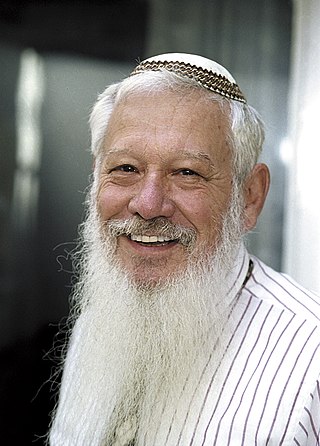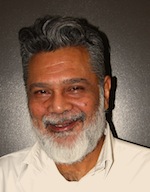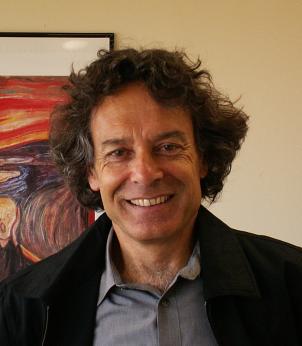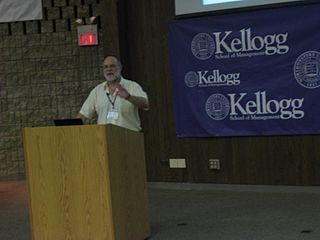
The Shapley value is a solution concept in cooperative game theory. It was named in honor of Lloyd Shapley, who introduced it in 1951 and won the Nobel Memorial Prize in Economic Sciences for it in 2012. To each cooperative game it assigns a unique distribution of a total surplus generated by the coalition of all players. The Shapley value is characterized by a collection of desirable properties. Hart (1989) provides a survey of the subject.
In game theory, a cooperative game is a game with competition between groups of players ("coalitions") due to the possibility of external enforcement of cooperative behavior. Those are opposed to non-cooperative games in which there is either no possibility to forge alliances or all agreements need to be self-enforcing.

Lloyd Stowell Shapley was an American mathematician and Nobel Memorial Prize-winning economist. He contributed to the fields of mathematical economics and especially game theory. Shapley is generally considered one of the most important contributors to the development of game theory since the work of von Neumann and Morgenstern. With Alvin E. Roth, Shapley won the 2012 Nobel Memorial Prize in Economic Sciences "for the theory of stable allocations and the practice of market design."
In cooperative game theory, the core is the set of feasible allocations or imputations where no coalition of agents can benefit by breaking away from the grand coalition. One can think of the core corresponding to situations where it is possible to sustain cooperation among all agents. A coalition is said to improve upon or block a feasible allocation if the members of that coalition can generate more value among themselves than they are allocated in the original allocation. As such, that coalition is not incentivized to stay with the grand coalition.

Robert John Aumann is an Israeli-American mathematician, and a member of the United States National Academy of Sciences. He is a professor at the Center for the Study of Rationality in the Hebrew University of Jerusalem in Israel. He also holds a visiting position at Stony Brook University, and is one of the founding members of the Stony Brook Center for Game Theory.
Hobart Peyton Young is an American game theorist and economist known for his contributions to evolutionary game theory and its application to the study of institutional and technological change, as well as the theory of learning in games. He is currently centennial professor at the London School of Economics, James Meade Professor of Economics Emeritus at the University of Oxford, professorial fellow at Nuffield College Oxford, and research principal at the Office of Financial Research at the U.S. Department of the Treasury.
In mathematics, a vector measure is a function defined on a family of sets and taking vector values satisfying certain properties. It is a generalization of the concept of finite measure, which takes nonnegative real values only.
In game theory, an epsilon-equilibrium, or near-Nash equilibrium, is a strategy profile that approximately satisfies the condition of Nash equilibrium. In a Nash equilibrium, no player has an incentive to change his behavior. In an approximate Nash equilibrium, this requirement is weakened to allow the possibility that a player may have a small incentive to do something different. This may still be considered an adequate solution concept, assuming for example status quo bias. This solution concept may be preferred to Nash equilibrium due to being easier to compute, or alternatively due to the possibility that in games of more than 2 players, the probabilities involved in an exact Nash equilibrium need not be rational numbers.
In game theory, a stochastic game, introduced by Lloyd Shapley in the early 1950s, is a repeated game with probabilistic transitions played by one or more players. The game is played in a sequence of stages. At the beginning of each stage the game is in some state. The players select actions and each player receives a payoff that depends on the current state and the chosen actions. The game then moves to a new random state whose distribution depends on the previous state and the actions chosen by the players. The procedure is repeated at the new state and play continues for a finite or infinite number of stages. The total payoff to a player is often taken to be the discounted sum of the stage payoffs or the limit inferior of the averages of the stage payoffs.

Pradeep Dubey is an Indian game theorist. He is a Professor of Economics at the State University of New York, Stony Brook, and a member of the Stony Brook Center for Game Theory. He also holds a visiting position at Cowles Foundation, Yale University. He did his schooling at the St. Columba's School, Delhi. He received his Ph.D. in applied mathematics from Cornell University and B.Sc. from the University of Delhi. His research areas of interest are game theory and mathematical economics. He has published, among others, in Econometrica, Games and Economic Behavior, Journal of Economic Theory, and Quarterly Journal of Economics. He is a Fellow of The Econometric Society, ACM Fellow and a member of the council of the Game Theory Society.

Yair Tauman is a Professor of Economics at State University of New York, Stony Brook and the Director of the Stony Brook Center for Game Theory. He studied at the Hebrew University of Jerusalem where he obtained his B.Sc. in Mathematics and Statistics and M.Sc. and Ph.D. in Mathematics, the latter two under the supervision of Robert Aumann. His areas of research interests are game theory and industrial organization. He has published, among others, in Econometrica, Games and Economic Behavior, Journal of Economic Theory, Quarterly Journal of Economics and RAND Journal of Economics.

Sergiu Hart is an Israeli mathematician and economist. He is the Chairperson of the Humanities Division of the Israel Academy of Sciences and Humanities, and the past President of the Game Theory Society (2008–2010). He also is emeritus professor of mathematics at the Kusiel-Vorreuter University, and the emeritus professor of economics at the Center for the Study of Rationality at the Hebrew University of Jerusalem in Israel.

Michael Bahir Maschler was an Israeli mathematician well known for his contributions to the field of game theory. He was a professor in the Einstein Institute of Mathematics and the Center for the Study of Rationality at the Hebrew University of Jerusalem in Israel. In 2012, the Israeli Chapter of the Game Theory Society founded the Maschler Prize, an annual prize awarded to an outstanding research student in game theory and related topics in Israel.
Aumann's agreement theorem was stated and proved by Robert Aumann in a paper titled "Agreeing to Disagree", which introduced the set theoretic description of common knowledge. The theorem concerns agents who share a common prior and update their probabilistic beliefs by Bayes' rule. It states that if the probabilistic beliefs of such agents, regarding a fixed event, are common knowledge then these probabilities must coincide. Thus, agents cannot agree to disagree, that is have common knowledge of a disagreement over the posterior probability of a given event.

Ehud Kalai is a prominent Israeli American game theorist and mathematical economist known for his contributions to the field of game theory and its interface with economics, social choice, computer science and operations research. He was the James J. O’Connor Distinguished Professor of Decision and Game Sciences at Northwestern University, 1975-2017, and currently is a Professor Emeritus of Managerial Economics and Decision Sciences.

The Shapley–Folkman lemma is a result in convex geometry that describes the Minkowski addition of sets in a vector space. It is named after mathematicians Lloyd Shapley and Jon Folkman, but was first published by the economist Ross M. Starr.

Jean-François Mertens was a Belgian game theorist and mathematical economist.

Eilon Solan is an Israeli mathematician and professor at the School of Mathematical Sciences of Tel Aviv University. His research focuses on game theory, stochastic processes, and measure theory.
Shmuel Friedland is an Israeli-American mathematician.










